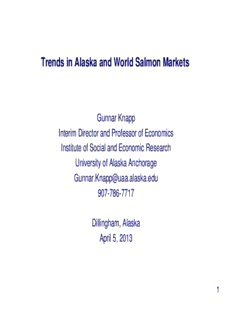
Trends in Alaska and World Salmon Markets PDF
Preview Trends in Alaska and World Salmon Markets
Trends in Alaska and World Salmon Markets Gunnar Knapp Interim Director and Professor of Economics Institute of Social and Economic Research University of Alaska Anchorage [email protected] 907-786-7717 Dillingham, Alaska April 5, 2013 1 This presentation will be posted online at my website: http://www.iser.uaa.alaska.edu/people/knapp/personal/ or you can e-mail me to request a copy: [email protected] 2 Outline of this Presentation 1. Trends in salmon markets • Catches • Production • End-markets • Prices • Value • Permit prices • World salmon supply • Farmed salmon prices 2. Factors affecting Alaska salmon markets 3. Future outlook for Alaska salmon markets 4. Data sources 3 Trends in Alaska Salmon Markets: Selected Important Trends . . . – After falling drastically in the 1990s, Alaska salmon prices and value have rebounded dramatically since 2002 • Ex-vessel and wholesale prices have risen dramatically (but fell slightly in 2012) – Ex-vessel and wholesale value have risen dramatically since 2002 – Both fishermen and processors have shared in the increase in prices and value • US markets for frozen salmon have diversified: – Less is being exported to Japan – More is being exported to the EU – More is being exported to China • (Most of the exports to China are reprocessed into value-added products which are re-exported to US and EU markets) – More is being consumed in US domestic markets • An increasing share of pink salmon is being frozen rather than canned 4 Trends in World Salmon Markets: Selected Important Trends . . . • Total world salmon supply has expanded dramatically over the past three decades • Farmed Atlantic salmon now accounts for 2/3 of world salmon supply • Global demand for salmon has expanded dramatically • Global markets have diversified dramatically – Salmon farmers have developed major new markets in Russia, Eastern Europe, Brazil, etc. • Global salmon demand has been growing strongly, helping to pull prices up • From 2008-2010, major disease problems in Chile lowered production— leading to a spike in prices • Since 2010 Chilean production has recovered strongly—causing prices to fall sharply in 2011 and the first part of 2012 • Over the past six months farmed prices have risen sharply • Some but not all markets for Alaska frozen and fresh salmon have been affected by farmed salmon pricing – Those markets which compete most directly with farmed salmon: • Frozen H&G, Frozen fillets, Fresh 5 TRENDS IN ALASKA SALMON HARVESTS 6 Sockeye, pink and chum account for most of Alaska’s salmon harvest volume and value. In this presentation I focus on markets for these three species. Alaska salmon harvests have generally been strong over the past decade. Note however that the 2012 harvest volume was the lowest since 1998—due to lower sockeye and pink harvests. 7 Harvest trends differ by species: * High but widely fluctuating pink harvests—fell sharply in 2012 * Sockeye harvests up from 1998-2003 levels—but fell in 2012 * Chum harvests fairly strong and consistent 8 TRENDS IN ALASKA SALMON PRODUCTION: PRODUCTS PRODUCED FROM ALASKA SALMON Note: These graphs are based on Commercial Operator Annual Report (COAR) data which are only available through 2011. 9 Frozen, canned and fresh salmon are all important sockeye salmon products. 10
Description: